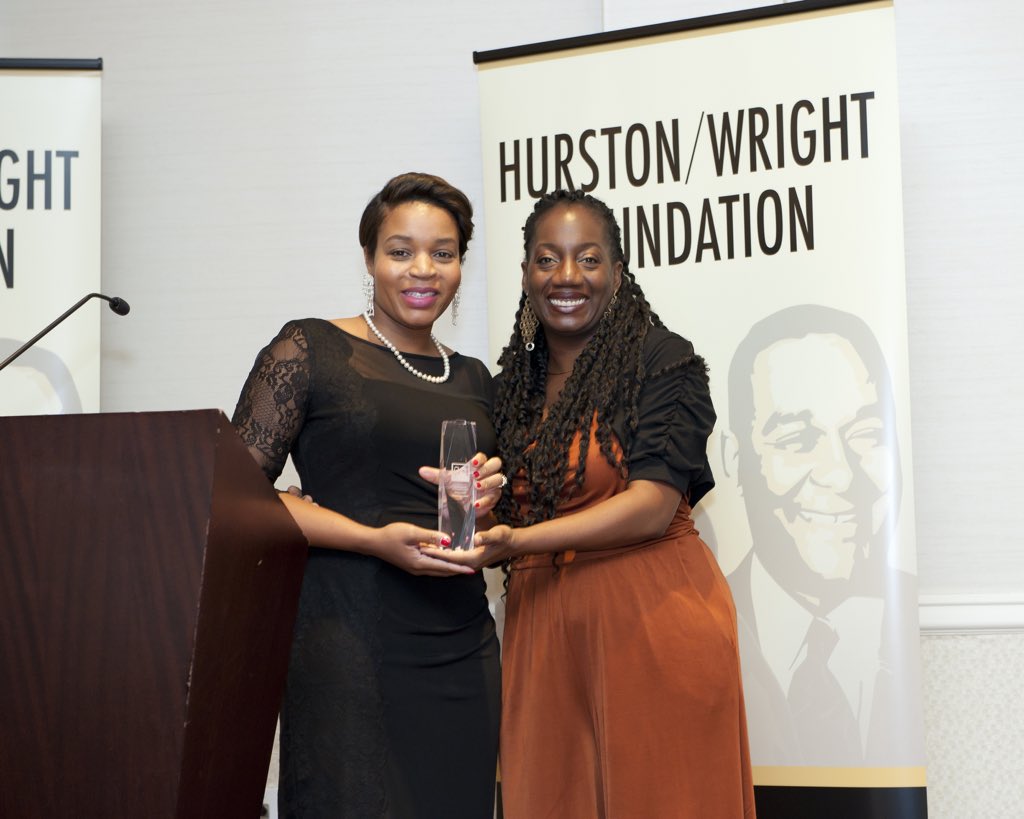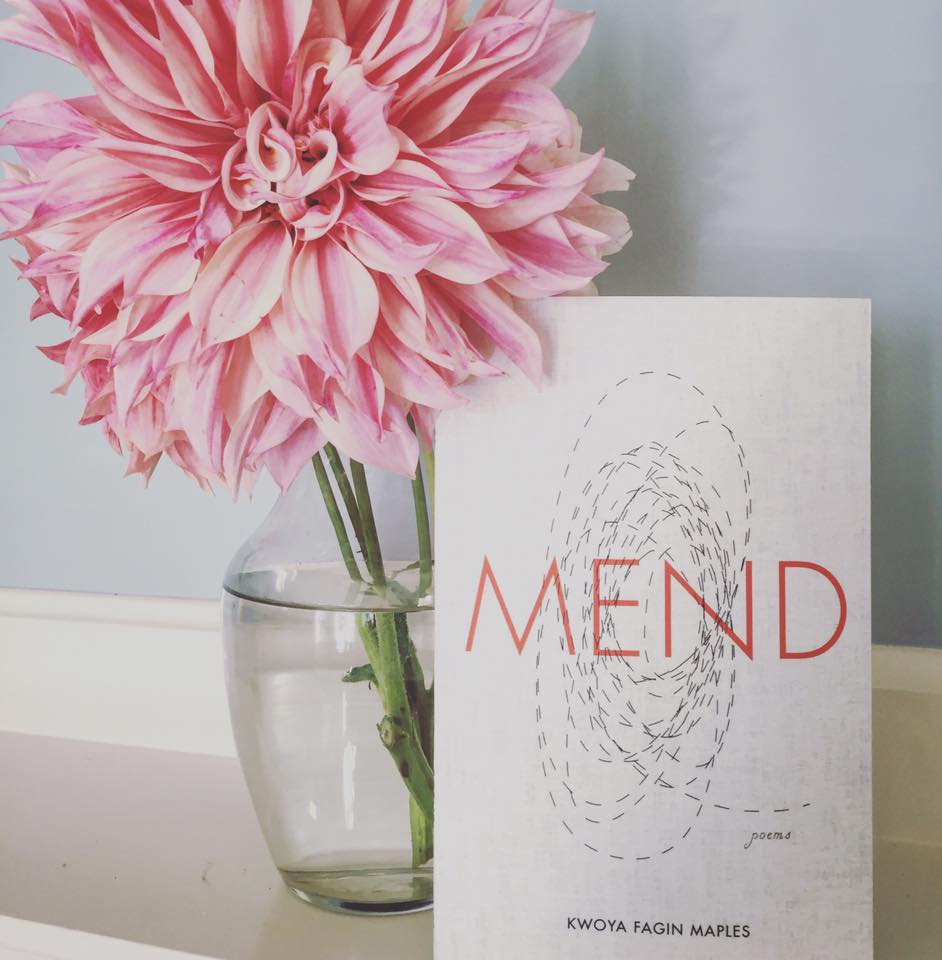Photo Cred: Maureen Thorson
UPDATE! Mend named as a 2019 finalist for the Hurston/Wright Legacy Award for Poetry!

University Press of Kentucky, 2018. Poetry and Prose Series Editor: Lisa Williams
Order your copy of Mend from UPK here. Mend is also available on Amazon.
Introduction to MEND
The inventor of the speculum, J. Marion Sims, is celebrated as the “father of modern gynecology,” and a memorial at his birthplace honors “his service to suffering women, empress and slave alike.” These tributes whitewash the fact that Sims achieved his surgical breakthroughs by experimenting on eleven enslaved African American women. Lent to Sims by their owners, these women were forced to undergo operations without their consent. Today, the names of all but three of these women are lost.
In Mend: Poems, Kwoya Fagin Maples gives voice to the enslaved women named in Sims’s autobiography: Anarcha, Betsey, and Lucy. In poems exploring imagined memories and experiences relayed from hospital beds, the speakers challenge Sims’s lies, mourn their trampled dignity, name their suffering in spirit, and speak of their bodies as “bruised fruit.” At the same time, they are more than his victims, and the poems celebrate their humanity, their feelings, their memories, and their selves. A finalist for the Association of Writers and Writing Programs Donald Hall Prize for Poetry, this debut collection illuminates a complex and disturbing chapter of the African American experience. –University Press of Kentucky
Praise for Mend
“Read this book now. Then read it again. The compassionate vision contained in these pages is as astounding as the history of the lives Kwoya Fagin Maples illuminates.” — Camille T. Dungy, author of Trophic Cascade
“This is a powerful book that illuminates one more complex, disturbing chapter of the African-American experience, a nineteenth-century white male physician’s gynecological experiments on female slaves. MEND is a brutal story, lyrically told in the voices of three of those women, and its author has memorably created both a painful reminder and a beautiful tribute.” — Kim Addonizio, from the runner up citation for The Donald Hall Prize
“Kwoya Fagin Maples says it plain: “Bodies above virtue are never black.” In her debut collection, Mend, here is a black southern poet and mother explicitly acknowledging the lineage from which she descends—we are both haunted and healed by history. Maples’s poems are narrative-driven, yet clear-voiced and lyrical; she writes us a world, a history, with her vision and leans back into a past to write herself into the story, while depicting the abuses to the black woman’s body in the name of science, and calls out: “There is suffering here.” In stories like those of Anarcha, Delia, and Sims, we hold our own breath through each sonnet sequence, each prose poem, until we understand, like Maples does, that the black mother’s body is “an aching shell but . . . worth tenderness.” — DéLana R. A. Dameron, author of Weary Kingdom: Poems
“Elegant and lush, Kwoya Fagin Maples’s verse reveals the beauty, truth, anger, despondency, drug– induced madness, and survival of Anarcha, Betsy and Lucy.” — Andrea Abrams, author of God and Blackness: Race, Gender and Identity in a Middle Class Afrocentric Church
“Kwoya Fagin Maples’s personae poems stun. Voiced such that we may not look away, Mend is a startling, stomping debut. Maples’s masterful image-making magnetizes and mesmerizes. But Mend is no dreamland to drift through—it’s a searing spotlight on a gruesome cog in the wheel of America’s past. It’s a litany of beautifully rhythmical and perfectly crushing poems. Art hurts and it heals. Kwoya Fagin Maples is a visionary doctor. History is humbled in her hands.” — Abraham Smith, author of Destruction of Man
“Mend is a work of vision and endurance. With a gaze at once tender and resolute, Maples delves into historical crimes committed against African American women’s bodies in the name of ‘research.’ Her lyricism retraces the boundaries of bodies otherwise defined by violation and pain, while her poet’s gaze returns the household objects employed as instruments of torture to the domestic settings in which they more rightly belong. In these poems, and for the women who people this book, intimacy becomes the site of bravery, denigration the site of beauty, and vulnerability the site of unsurpassable strength.” — Joyelle McSweeney, author of Dead Youth, or, the Leaks
“Ancestral women whose strengths and humiliations have too long been lost to history, and contemporary women writing and revising their own storylines, spring to vivid life in these vigorously imagined, vibrantly musical, meticulously considered poems. Maples does not flinch to enunciate the disgusting truths of racism and misogyny; neither does she neglect the possibility of beauty. These poems carry an unbearable weight of witness: so much suffering, but also the joy of survival, the survival of joy. Open the door, enter “the back yard of things past telling,” and be mended.” — Joel Brouwer, University of Alabama

